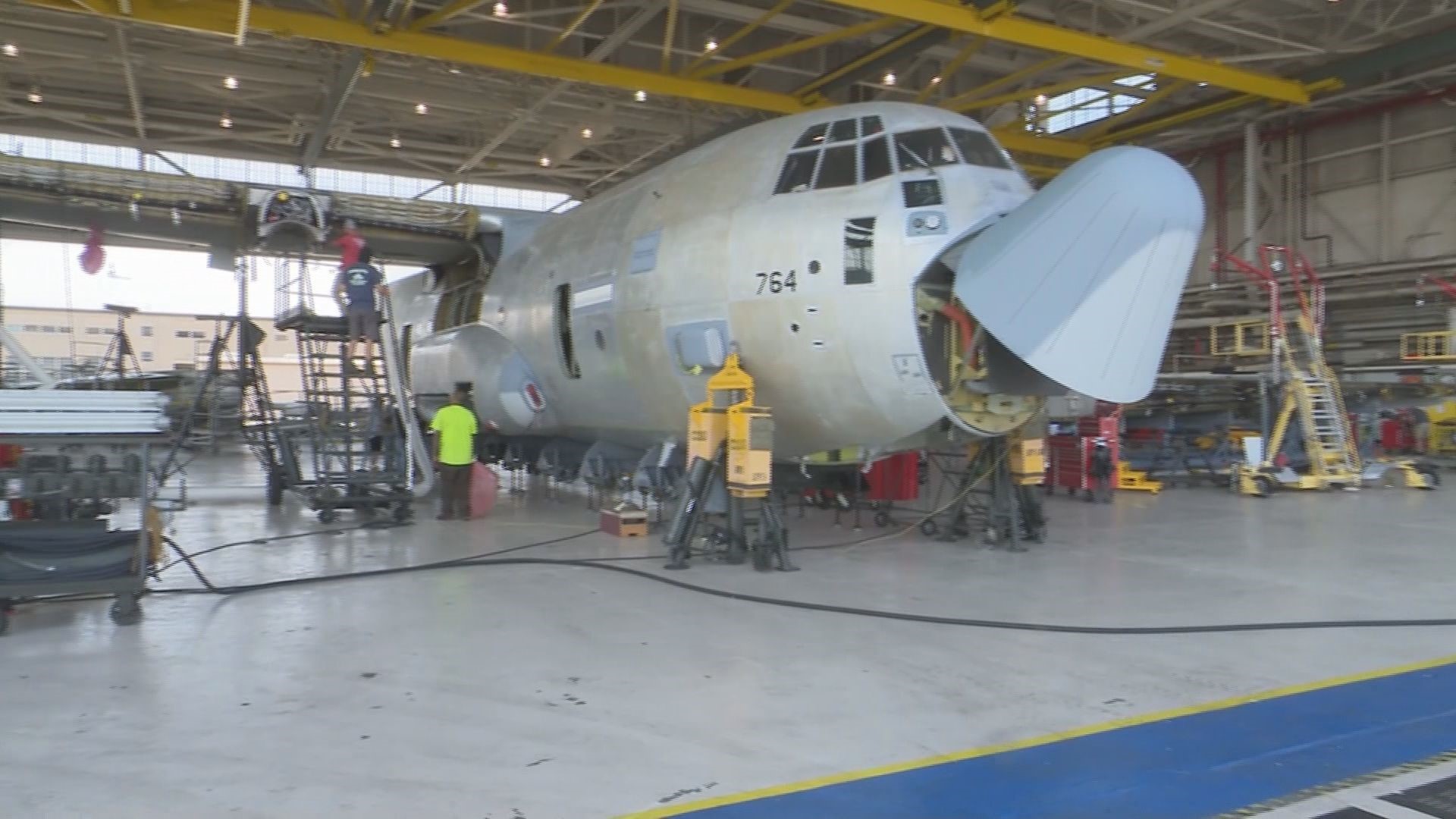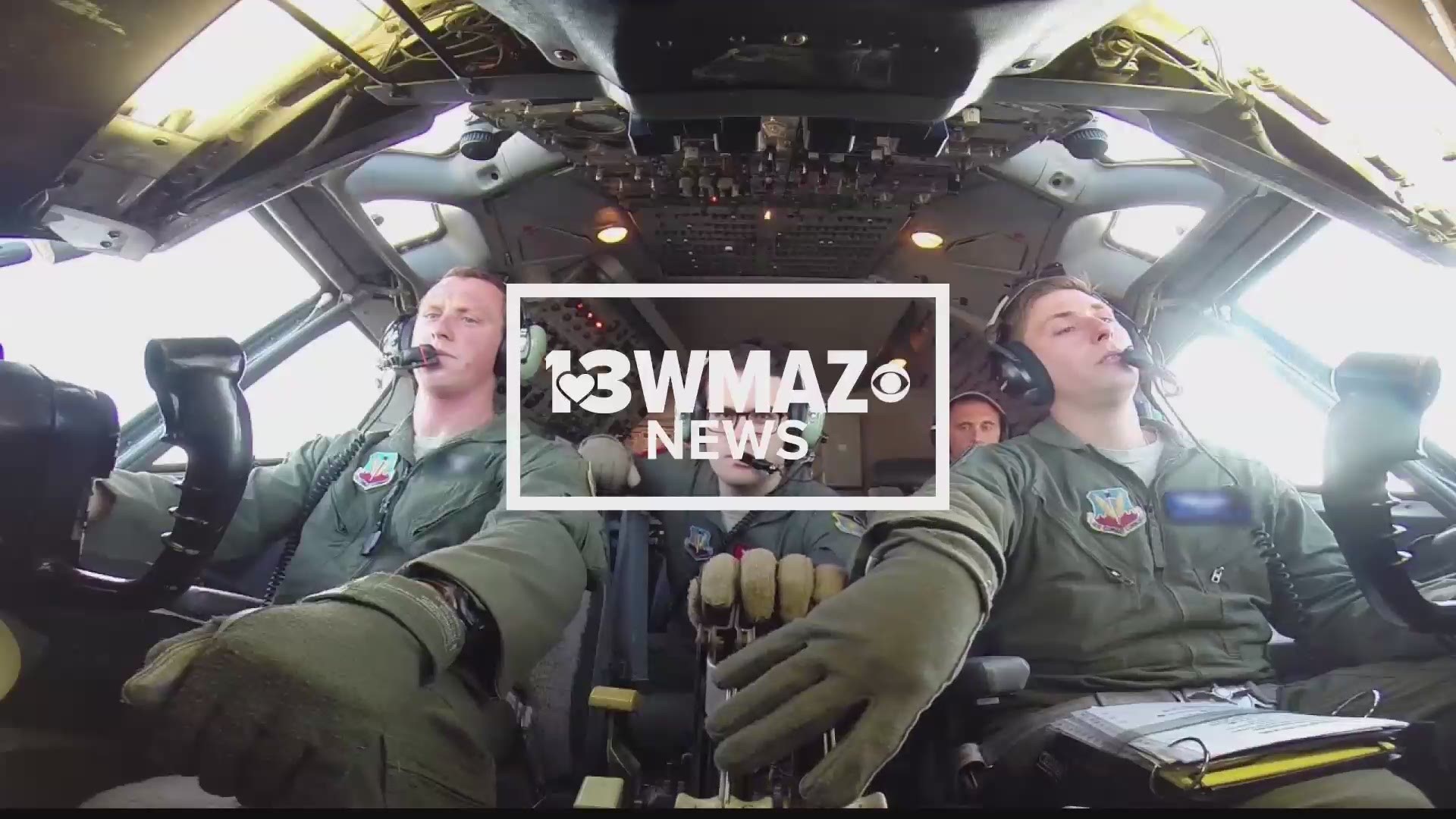FLYING INTO THE FUTURE | Robins Air Force Base leaders promote progress
Base leaders gave 13WMAZ an exclusive look at the work on the horizon at Robins at how it will impact Central Georgia

Leadership changes, new programs, and more are on the way for Robins Air Force Base. Commanders of many of the major units on the base sat down with the 13WMAZ for an up-close look at what is on the horizon.
Warner Robins Air Logistics Complex General John Kubinec, Commander
The Air Logistics Complex has added many new projects to its workload including work on the Global Hawk drone, additional C-130 work, and maintenance on the E-8C jets used across the base by JSTARS.
"There's really, quite frankly, more work out there than we can do that our Air Force has for us," said WR-ALC Commander General John Kubinec.
He is, however, encouraged by Central Georgia's response to the "1,200 in 12 Months" hiring campaign.
"I keep telling people in Washington that we have the workforce. The workforce is here. If we had more facilities, we could do more work," he said.
General Kubinec says he's almost finished with a $25 million project to re-arrange work at the base and maximize hangar capacity, leaving more room to accommodate more planes and possibly new missions.
"As we move into '20, we will have the workforce on board. There will still be a bit of a training burden, but for the first time since I've worked here, we will have the workforce that we are authorized to have for the work that we have," he said.
He hopes that will send a strong message to Air Force and congressional leaders to eventually expand the facilities on the base.
Kubinec says he doesn't know exactly what new missions could be on the horizon, but he says Robins has been busy tackling other new workloads like the Global Hawk drone program and taking on additional C-130 work.
He says no matter what other work comes to Robins, training workers and giving them all of the proper resources will be a top priority.
In 2017, a KC-130 plane crashed in Mississippi, killing all 16 service members on board. Military investigators later faulted work done at Robins for the crash.
"Our workforce was crushed when they heard this," he said. "They questioned if they did something wrong. I think we, as leadership, didn't give them all the tools they needed, like clear technical manuals, and we had different processes in place, all of that has been addressed now."
RELATED: 'It didn't have to happen:' Widow reacts to military report blaming Robins AFB for fatal crash
General Kubinec says the base brought in military and industry experts to help overhaul and streamline the processes in the propeller shop and other areas within the Air Logistics Complex. He says they hope to finally put the first propeller through production this summer, two years after the crash.
He says this, again, serves as a reminder of the importance of proper training, as the base welcomes 1,200 new employees brought in through the recent hiring campaign and as they look to continue bringing in more employees.
"We need to have a consistent battle rhythm," he said. "We need to have a consistent demand signal to our technical colleges, and we need to let people in the community know that we are still hiring."
He says they will continue to utilize the hiring site put online at the start of the "1,200 in 12" campaign.
78th Air Base Wing Colonel Lyle Drew, Commander
Colonel Lyle Drew is considered the "mayor" of the base. He's in charge of base-wide logistics as the commander of the 78th Air Base Wing.
Over his two years in command, Colonel Drew says one of his most proud accomplishments is streamlining the base's hiring process to help bring in more employees.
"We instituted one-stop hiring events and cut our hiring process down almost 92 days in the past two years," he said.
Colonel Drew also credits congressional leaders for allowing the base to have Direct Hire Authority during the "1,200 in 12" hiring campaign. He says continuing partnerships with local school districts and colleges will prove crucial to recruiting skilled workers.
Colonel Drew also says, over the past two years, Robins helped 1,632 airmen deploy to several places around the world.
"To do that, and to have them ready, you really need to focus on that process, not just when they're getting ready to go, but throughout the entire year," he said.
Colonel Drew leaves for his next assignment this summer, and says he's confident in the next commander, Colonel Brian Moore.
Moore will come to Robins from one of the other Air Force depots, Tinker Air Force Base in Oklahoma.
"I think the challenge to any commander that comes after me is, as new missions are identified to come to Robins, how do you shape that environment? How do you signal that to the community so they know how to support it?" he said.
He says since Robins works very closely with the other Air Force Depots, Colonel Moore will have a great understanding of what it takes to keep Robins moving in the right direction.
Air Force Reserve Command Major General Kenneth Lewis, Deputy Commander
About 75,000 Air Force Reservists are stationed all around the world, all ultimately under the command of leaders at the Air Force Reserve Command Headquarters at Robins.
"We have taskings just like the regular Air Force," said Deputy Commander Major General Kenneth Lewis. "We can be out the door usually within hours but a maximum of about 72 hours, we can be anywhere in the world."
He says that could be for refueling or fighter missions or helping with training.
"If you were to ask anybody about the Reserve, what the greatest attribute is, it's experience," he said.
He says that experience has been crucial in helping to boost low pilot numbers on the active duty side.
"We've been able to provide jets with experienced pilots to do the training and maintenance so we can get these regular Air Force numbers up, and we can get them up much quicker than they they can," he said.
General Lewis says the workload remains high for reservists and leaders are working to streamline several processes to help lighten the load. He says this will be especially helpful for civilian airmen, who balance time working with reserve units and their civilian jobs.
"I really admire the folks that can do this," he says. "They have to keep their civilian employer happy, they have to keep their spouse happy, and they have to keep their military supervisor happy."
116th Air Control Wing - JSTARS Colonel Ato Crumbly, Commander
There is a saying at Robins that "the sun never sets on the JSTARS mission," but the sun will soon set on JSTARS as it is known right now.
The dated E8-C planes used now for reconnaissance missions will eventually be replaced by what is called Advanced Battle Management System, or ABMS.
The future change has prompted many questions about the future of the two units that make up JSTARS and how that will impact jobs.
"ABMS is going to be a system of systems," said Colonel Ato Crumbly, Commander of the 116th Air Control Wing.
His unit is the Georgia Air National Guard component of JSTARS.
"The unit may not look the same because you may not see as many planes out there, but that system will need more intel people, more cyber people. So, what's going to happen is I take the available people that I have now and retrain them," he said.
He says recruiting at schools like Mercer, Fort Valley State University, and Georgia Tech will be extremely important to help fill the intel and cyber jobs created through the implementation of ABMS.
He says, right now, there is no direct timeline for ABMS, but he's optimistic about what it will eventually mean for his unit, JSTARS, Robins, and the Central Georgia community.
As part of the Air National Guard, the 116th is also responsible for responding in times of emergency like hurricanes or other natural disasters.
461st Air Control Wing - JSTARS Colonel Curtis Bass, Commander
The 461st Air Control Wing is the active duty component of JSTARS and works hand-in-hand with the 116th Air Control Wing.
Commander of the 461st, Colonel Curtis Bass says he is also confident in the future of JSTARS with the eventual transition to ABMS.
"I think budgeting, sustainment, and how we move forward with our Air Force is going to depend on whether you are connected to ABMS or not. That is going to happen right here in middle Georgia with probably and possibly a fusion center on the ground as well as flying planes and possibly in remote-operated aircraft," he said.
He says the surrounding Central Georgia community will be a key factor in the success of ABMS and believes that is a big reason why Air Force leaders decided to bring the system to Robins.
"There is space on this base to expand as well as the technical capabilities of this region to feed the fight," he said. "A lot of organizations can help feed the mission from a civilian side of the house."
He says the relationship between the 461st and 116th will also help with the transition.
"With the Guard bringing their expertise and active duty providing members as well to that fight, that will bring expertise from their different assignments around the world, the Advanced Battle Management System will be set very well," he said.
Colonel Bass leaves for a new assignment in New York this summer. Current Vice Commander Edward Goebel will move up to lead the 461st.
"He will bring with him two years of continuity and two years of understanding the mission," said Colonel Bass.
21st Century Partnership Chrissy Miner, President and CEO
The 21st Century Partnership formed in the 1990s when Robins found itself on the Base Realignment and Closure list.
"Our sole focus is a laser-like focus on protecting and maintaining, growing Robins Air Force Base," said President and CEO Chrissy Miner.
"We can't do it alone," she said. "What we do is we connect and collaborate, and we facilitate."
With so many recent success stories at Robins, Miner says another round of BRAC isn't the biggest threat to the base.
"The real threat is the year-to-year process that we go through to make sure that the appropriations remain here at Robins and we continue to grow and we don't lose missions," she said.
She says continuing to recruit skilled workers will be a big hurdle, with so many opportunities and positions available in the private industries.
The partnership even brought in a retired engineering recruiter from Robins to help promote opportunities on the base.
"We're trying to supplement the base and their efforts by using his expertise and implementing that within the community to help be a microphone and an extended voice of Robins Air Force Base," she said.
On the federal level, Miner says her group is focused on the Budget Control Act of 2011, better known as Sequestration.
"This is still a law," she said. "We have to make sure that our legislators know that it is critical that they don't go back on those budget caps, which would severely hamper the readiness that has been gained over the last few years."
She says legislators have signaled they will do what it takes to avoid the across-the-board cuts that made a big impact at Robins and military installations around the country in 2011.


